
Antônio Carlos Brasileiro de Almeida Jobim, also known as Tom Jobim, was a Brazilian composer, pianist, guitarist, songwriter, arranger, and singer. Considered one of the great exponents of Brazilian music, Jobim internationalized bossa nova and, with the help of important American artists, merged it with jazz in the 1960s to create a new sound, with popular success. As such, he is sometimes known as the "father of bossa nova".

Francis Albert Sinatra & Antônio Carlos Jobim is a 1967 album by Frank Sinatra and Antônio Carlos Jobim. The tracks were arranged and conducted by Claus Ogerman, accompanied by a studio orchestra. Along with Jobim's original compositions, the album features three standards from the Great American Songbook, arranged in the bossa nova style.
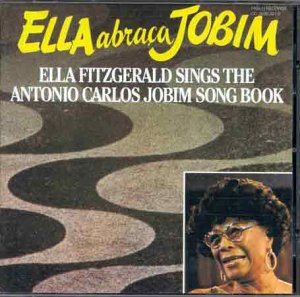
Ella Abraça Jobim or Ella Fitzgerald Sings the Antonio Carlos Jobim Songbook is a 1981 studio album by Ella Fitzgerald, devoted to the songs of Antônio Carlos Jobim.
Love, Strings and Jobim is a 1966 album by various Brazilian artists who play new Brazilian songs by various composers. Because Antônio Carlos Jobim is pictured on the cover and mentioned in the title, he has been and continues to be credited to be the performing artist on the album. Jobim does not appear on the album except as a composer. The original Brazilian title of this album is "Tom Jobim Apresenta" and it appeared on the Elenco label.

The Sinatra–Jobim Sessions is a 1979 double LP compilation album of Frank Sinatra's work with Antônio Carlos Jobim. The album was published only in Brazil by producer Roberto Quartin, and had never been re-released on vinyl or CD until 2010 when it was re-mastered and released under The Frank Sinatra Collection and became available worldwide.

Terra Brasilis is the 11th album by Antônio Carlos Jobim. It was recorded at the RCA Recording Studios in New York City and released in 1980. The album includes reworkings of old songs as well as new material and placed 42nd on the US Jazz Albums 1980 year-end chart.
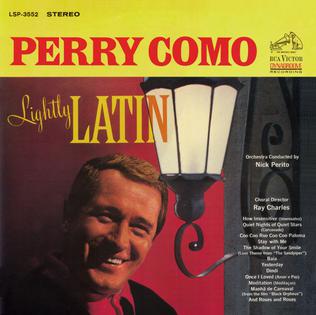
Lightly Latin is Perry Como's 13th RCA Victor 12" long-play album.
"Inútil Paisagem" is a song composed by Antônio Carlos Jobim, with lyrics by Aloysio de Oliveira. An English-language version with lyrics by Ray Gilbert is titled "If You Never Come to Me".

Brazil is a 2000 album by Rosemary Clooney. John Pizzarelli accompanies Clooney on vocals on five of the tracks, and sings Antonio Carlos Jobim's "Wave". Diana Krall duets with Clooney on "The Boy from Ipanema". The arrangements primarily feature woodwinds, piano and guitar, and do not feature brass instruments.
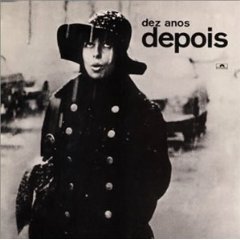
Dez anos depois is a 1971 double album of bossa nova standards by Brazilian singer Nara Leão.
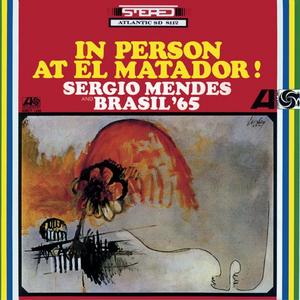
In Person at El Matador is a 1965 live-album by Sérgio Mendes and Brasil '65. It was recorded at El Matador in San Francisco, California

Sinatra/Jobim: The Complete Reprise Recordings is a 2010 compilation album by Frank Sinatra, consisting of 20 tracks he recorded with the Brazilian musician Antônio Carlos Jobim.
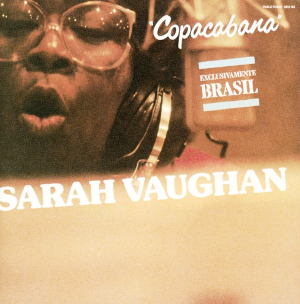
Copacabana is a 1979 album by Sarah Vaughan. It was Vaughan's second album of bossa nova following I Love Brazil!; her third album of Brazilian music, Brazilian Romance followed in 1987.
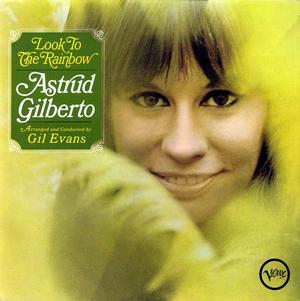
Look to the Rainbow is a 1966 album by Astrud Gilberto, arranged by Gil Evans and Al Cohn.
This is a list of published recordings of Antônio Carlos Jobim.
"Samba do Avião", also known as "Song of the Jet", is a Brazilian song composed in 1962 by Antônio Carlos Jobim, who also wrote the original Portuguese lyrics. The English-language lyrics are by Gene Lees.
"Ela é Carioca" is a bossa nova song composed in 1963 by Antônio Carlos Jobim, with Portuguese lyrics by Vinícius de Moraes. English lyrics were written by Ray Gilbert. The song is sometimes titled "Ele é Carioca ."
"A felicidade" ("Happiness") is a bossa nova song by Antônio Carlos Jobim, with lyrics by Vinícius de Moraes, composed in 1958 for the French film Orfeu Negro.

Inédito was a privately commissioned studio album by Antônio Carlos Jobim, released in 1987 in a limited edition to commemorate his 60th birthday, and re-released in 1995 for the general public. It was released in the United States in 2006 as The Unknown, by DRG Records.
It's a Quiet Thing is a 1965 album by Morgana King with arrangements by Torrie Zito.













